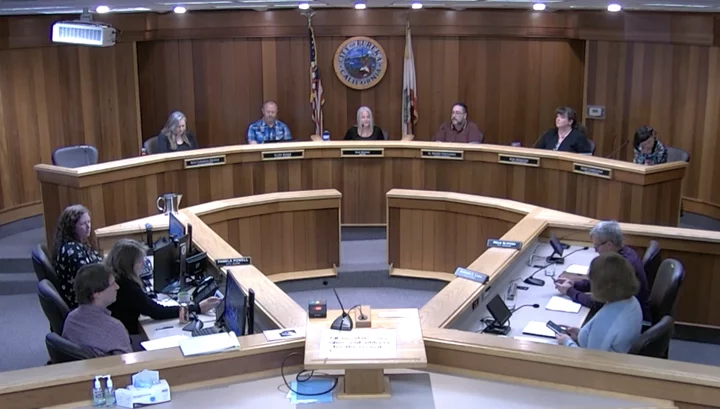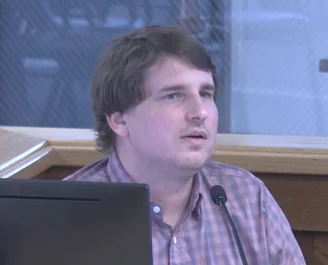Screenshot of Tuesday’s special Eureka Council meeting.
[CORRECTION: Oops! We misinterpreted some information in the city’s budget. The City of Eureka’s general fund will not have a $1.4 million surplus in the upcoming fiscal year as originally stated. Essentially, the budget will be balanced, according to staff. The Outpost deeply regrets this error.]
###
It’s that time of the year again: Budget season!
The Eureka City Council met for a special meeting on Tuesday evening to take a look at the proposed budget for the upcoming fiscal year and review the status of the city’s major funds.
How are Eureka’s finances shaping up so far? By and large, the city is doing quite well.
“There aren’t many changes expected in the 2023-24 fiscal year in terms of the financial health of the city,” Eureka’s Finance Director Lane Millar told the Outpost. “Our sales tax revenues weren’t as good as they were last year. You know, everything went up during the pandemic but things have gone down since and kind of come back to normal. Things are looking good.”
The general fund – the city’s primary operating fund – grew by approximately $1.5 million in the current fiscal year but revenues are not expected to grow in the 2023-24 fiscal year due to increasing expenditures.
“The [general] fund has a surplus, but a much smaller surplus than the current fiscal year,” Millar said. “Overall expenditure growth is not exceptional nor unexpected due to salary increases that were approved in prior years. … Surpluses are nice to have because they add to the city’s reserves, but just having a balanced budget is also a good thing.”
The Eureka Police Department is projected to receive $16,085,838 from the general fund, up by a little over $500,000 from the current fiscal year. Similarly, the contributions to Humboldt Bay Fire, which receives about 65 percent of its funding from the city, have grown by about $200,000.
The city’s government and administration fund has increased by approximately $300,000, or seven percent, from the current fiscal year. The most notable increase in expenditures goes to the mayor’s division, which more than doubled, at 115 percent.
During Tuesday’s night’s meeting, Millar took questions from councilmembers about the budget adjustments – including about why so much more money was going to the mayor’s office.
He noted that the seemingly drastic increase “has nothing to do with any changes in the mayor’s office.” Rather, it highlights the “high costs for healthcare that the city pays.”
“When we started this fiscal year, [Mayor Kim Bergel] did not have health insurance [through the city],” Millar explained. “And now – starting in 2023-24, they took advantage of our health insurance plans and the cost of the family plan to the city is about $20,000 [annually]. So, you can see how that can really affect a small budget.”
Revenues are up for the water and wastewater funds following the adoption of the new rate study that was approved at the end of last year, Millar said. Water fund expenditures are down, largely due to “transfers,” which are monies used for capital projects. In contrast, transfers have caused wastewater fund expenditures to go up.
The harbor fund is up as well. Revenues are up due to an increase in rent and lease revenues and, overall, the fund has a pretty balanced budget, he said.
Revenues are down in the building fund due to a smaller subsidy from the general fund. Expenditures are down as well, which Millar attributed to efficiencies within the department.
“The building fund has two divisions and two departments, but the main operation is the building division within development services,” he said. “Their budget is dropping significantly. About $200,000 of [their budget comprises] two positions that [the city is] not funding in 2023-24. … We’re not eliminating positions, but we’re not funding them because we don’t anticipate filling those positions next fiscal year.”
Councilmember Kati Moulton asked Millar to elaborate. City Manager Miles Slattery jumped in and explained that the city’s new building official Brendan Reilly “has made drastic changes to that division” in the last year and a half to increase efficiencies throughout the department.
“We’ve kept those positions in place just in case we were to see an uptick or a need for those and, according to the chief building official, we do not right now,” Slattery said.
Turning back to the harbor fund, Councilmember Leslie Castellano asked if there would be funding available for improvements at the marina near the Wharfinger Building. “Folks residing at the public marina have reached out to me in the past year just about, you know, requesting improvements to the facilities and I just want to make sure that those are included in the budget,” she said.
Slattery said the city has already initiated some improvements at the public marina, but added that it has “opened up a can of worms” and is costing the city more money than anticipated.
“A lot of the issues we have with the harbor fund is that there’s a lot of long-standing leases that we’ve had that weren’t at market rate for a very long time and some of them were coming up,” he continued. “And I think that that’s an area where we can improve in order to get better market rate for some of the properties that we do have. But I can assure you that every dime that we get out of the harbor fund goes back into the harbor.”
Millar also went through funding allocations from the American Rescue Plan Act, or ARPA. The city received nearly $6.4 million in ARPA funds from the federal government during the COVID-19 pandemic and has only used $230,000 of that money to date. There are several projects planned for the remaining funds, including wastewater projects, enhanced broadband infrastructure, street reconstruction, fire station improvements and allocations to the city’s housing trust fund, among others.
After a bit of additional discussion, the council agreed to accept the report but did not take any further action on the item.
The next budget discussion on June 20 will focus on reserves, Measure H spending and city employee pensions, or CalPERS.
###
DOCUMENT: Proposed Budget for Fiscal Year 2023-24



CLICK TO MANAGE